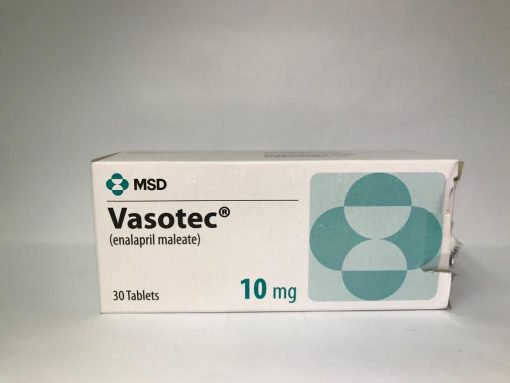
Understanding the Role of Vasotec
Vasotec, known by its generic name Enalapril, is a key medication in the treatment of high blood pressure (hypertension) and heart failure. As an ACE (angiotensin-converting enzyme) inhibitor, Vasotec helps manage cardiovascular conditions by reducing blood pressure and easing the heart’s workload. Whether prescribed for hypertension, heart failure, or other cardiovascular conditions, Vasotec plays an important role in maintaining heart health and preventing complications.
How Vasotec Works: Regulating Blood Pressure and Heart Function
Vasotec works by inhibiting the enzyme that produces angiotensin II, a substance that narrows blood vessels and raises blood pressure. By blocking this process, Vasotec causes blood vessels to relax and widen, improving blood flow and lowering blood pressure. Additionally, this reduction in vascular resistance decreases the strain on the heart, making Vasotec an essential treatment for both hypertension and heart failure.
Applications Beyond Hypertension: Protecting the Heart and Kidneys
In addition to treating high blood pressure, Vasotec has broader applications, including preventing kidney damage in patients with diabetes and improving survival rates after a heart attack. By improving the efficiency of the heart and reducing complications, Vasotec contributes to long-term cardiovascular health. In cases of left ventricular dysfunction or cardiomyopathy, Vasotec also aids in reducing symptoms and hospitalizations.
Dosage and Administration: Tailored to the Patient
Vasotec is typically administered once or twice daily, with or without food. The dosage depends on the patient’s condition and response to treatment. Starting doses are often lower for heart failure patients, and adjustments are made based on blood pressure readings. Adherence to prescribed dosages is critical for achieving optimal results, and patients should avoid skipping doses.
Potential Side Effects: What to Expect
While most patients tolerate Vasotec well, some may experience side effects such as dizziness, fatigue, dry cough, or headaches. More serious side effects, like swelling of the face or difficulty breathing, require immediate medical attention. It’s important for patients to monitor their symptoms and consult their healthcare provider if any concerning reactions occur.
Drug Interactions and Precautions: Ensuring Safe Use
Vasotec may interact with certain medications, including NSAIDs, diuretics, and potassium supplements. Patients should provide their doctors with a complete list of medications and supplements to avoid adverse interactions. Vasotec is not recommended for use during pregnancy, as it may harm the fetus, and caution is advised for nursing mothers.
Optimizing Vasotec Therapy: A Partnership in Health
To maximize the benefits of Vasotec, patients should follow their treatment plan closely, stay informed about potential side effects, and communicate openly with their healthcare provider. This approach ensures that Vasotec’s powerful effects in managing blood pressure and heart conditions are used to their full potential, leading to better health outcomes and a higher quality of life.
